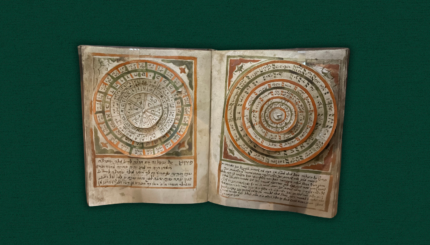Although both Shemini Atzeret and Simchat Torah are curiously bereft of special home customs, both are full festivals marked by holiday meals, special blessings, and a prohibition on work. At the evening meals on both days, the holiday candles are lit, and the festival Kiddush, or blessing over wine, acknowledges that God has given the Jews “the eighth day, this Festival of Assembly, the time of our gladness.”
Because Simchat Torah is focused on celebrating with the Torah scrolls—chanting, dancing, and singing—it is not surprising that the day is almost entirely synagogue focused. Shemini Atzeret is a little different—why does God mandate a festival with little ritual uniqueness except for the prayer for rain recited in the synagogue? The answer is found in a Talmudic elaboration of the holiday’s essence, since the Torah itself is vague about the meaning of the holiday. Leviticus 23:36 states: “Seven days you shall bring offerings by fire to the Lord. On the eighth day you shall observe a sacred occasion (atzeret) and bring an offering by fire to the Lord; it is a solemn gathering: you shall not work at your occupations.” Trying to get to the essence of the verse, the rabbis reinterpreted the meaning of the word atzeret as “to tarry.” They postulated that God finds it difficult to part with the Jews who have been so actively involved in seven days of celebration and asks them “to tarry a little longer.” It is almost as if God is seeking an intimacy that precludes ritual and custom.
Consequently, the only real home custom of Shemini Atzeret harkens back to Sukkot. This is the day when the Jews leave the sukkah—slowly, tarrying, still experiencing the festive atmosphere. On Shemini Atzeret Jews linger in the sukkah. According to a variety of customs, some eat both the evening meal and the following day’s meal in the sukkah and make the blessing over wine, the kiddush, at both meals. Some make the blessing at one meal only (while some eschew the sukkah altogether). In all cases, because Shemini Atzeret is a unique holiday, the commandment to dwell in the sukkah no longer holds, and the blessing leshev basukkah, “to dwell in the sukkah,” is not recited.
Shemini Atzeret is not only a time for lingering in the sukkah, but a time for saying goodbye to the holiday season as well. Some people gather in the sukkah in the afternoon with friends and family to eat cake or fruit and have a drink (alcoholic or non-alcoholic) and then together to say good-bye to the sukkah for the current year. Whenever the final meal in the sukkah takes place, the following formulaic good-bye is recited by some Jews: “May it be Your will, Adonai, our God and the God of our ancestors, that just as I have fulfilled the mitzvah and dwelt in this Sukkah, so may I merit in the coming year to dwell in the Sukkah of the skin of Leviathan” (the skin of Leviathan alludes to messianic times).
With your help, My Jewish Learning can provide endless opportunities for learning, connection and discovery.
mitzvah
Pronounced: MITZ-vuh or meetz-VAH, Origin: Hebrew, commandment, also used to mean good deed.
sukkah
Pronounced: SOO-kah (oo as in book) or sue-KAH, Origin: Hebrew, the temporary hut built during the Harvest holiday of Sukkot.
Torah
Pronunced: TORE-uh, Origin: Hebrew, the Five Books of Moses.


